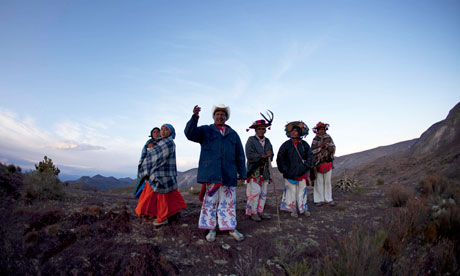The global mining, oil and gas industries have expanded so fast in the last decade they are now leading to large-scale "landgrabbing" and threatening farming and water supplies, according to a report by environment and development groups in Europe, Africa and India.
"The catalogue of devastation is growing. We are no longer talking about isolated pockets of destruction and pollution. In just 10 years, iron ore production has more than doubled, coal has risen 45% and metals like lithium by 125%. Across Africa, Latin America and Asia, more and more lands, rivers and aquifers are being devoured by mining activities.
"Industrial wastelands are being formed by vast open-pit mines and mountain top removal, and the poisoning of water systems, deforestation, and the contamination of topsoil," says the report by the Gaia foundation and groups including Friends of the Earth International, Grain, Oilwatch and Navdanya in India.
The dramatic increase in large-scale mining, clearly seen in places such as the Amazon for gold and oil, India's tribal forest lands for bauxite, South Africa for coal and Ghana for gold, is being fuelled by the rising price of metals and oil. These have acted as an incentive to exploit new areas and less pure deposits, says the report.
"Technologies are becoming more sophisticated to extract materials from areas which were previously inaccessible, uneconomic or designated of 'lower' quality," it says. "That means more removal of soil, sand and rock and the gouging out of much larger areas of land, as seen with the Alberta tar sands in Canada."
Economies are getting better at reducing the intensity of the use of raw materials but the sheer increase in their absolute consumption is now staggering, say the authors. According to the US Mineral Information Institute, the average American will use close to 1,300 tonnes of minerals in a lifetime. Global energy demand, which is based largely on fossil fuels, is expected to increase 35% by 2030, according to oil firm Exxon.
Africa is the epicentre of the mining industry's search for minerals. Of the 10 biggest mining deals to be completed last year, seven were in Africa, according to Ernst & Young. Mining group Anglo American has earmarked $8bn (£5bn) for new platinum, diamond, iron ore and coal projects on the continent, and Brazil's Vale has said it plans to spend more than $12bn over the next five years in Africa.
According to the Economist magazine, Ernst & Young recently suggested that southern African countries such as Botswana, Mozambique and Namibia were becoming increasingly attractive mining destinations.
China, which has invested heavily in African mines, now sucks up much of the world's mineral resources. According to the report, it uses 53% of the world's cement, 47% of its iron ore, 46% of its coal and more than 40% of the world's steel, lead, zinc and aluminium. However, it re-exports much of this in the form of finished products for world markets.
The loss of enormous quantities of soil, and the eviction of people to make way for large-scale extraction now threaten to make millions of people landless and hungry, a recipe for social problems, says the report.
Water could well be a factor in limiting the extraction of minerals in future. Most mining companies have said they are already experiencing shortages. If demand continues to grow at the same rate that it has in the last decade, industry demands for fresh water are expected to grow from 4,500bn cubic metres today to 6,900bn cubic metres in 2030.
"Humans have almost cleared the surface of the earth. Now all efforts are geared towards going beneath the surface. Large-scale mining is now targeting all parts of the planet," said Gathuri Mburu, co-ordinator of the African Biodiversity Network.

